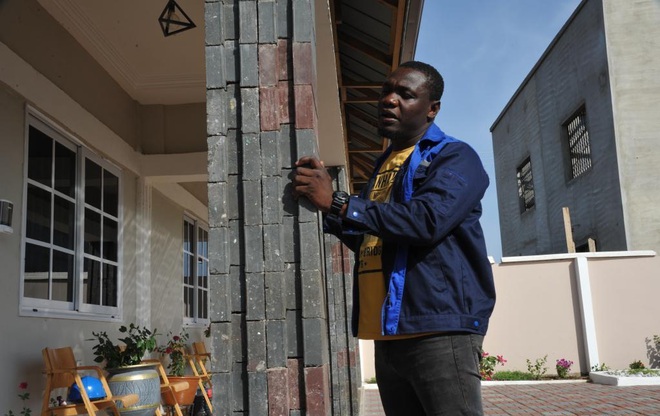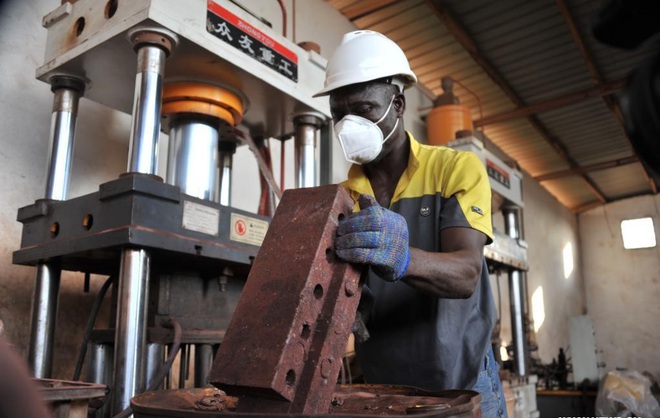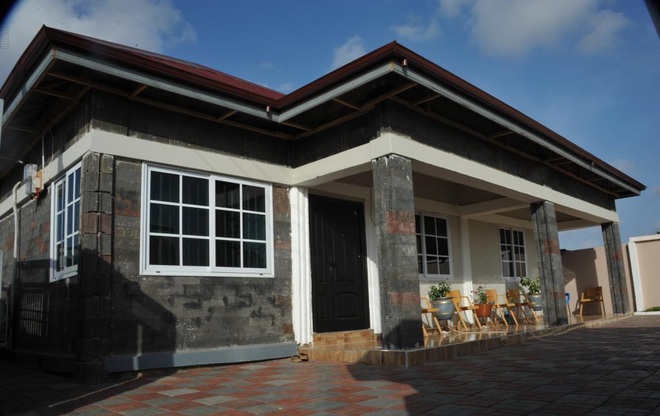With a dream to bring affordable, environmentally friendly houses to poor people in his hometown, the young man is determined to start a business with a brick factory made from recycled plastic waste.
18 years ago, Nelson Boateng, from Accra, Ghana, had to earn money to take care of his parents’ medical care and school, so he applied for a job at a plastic recycling company in the east of the city. His job is to operate and repair garbage pushers.
Due to his hard work and progress, Nelson Boateng’s manager is very pleased. They enthusiastically taught him how to repair and build many mechanical devices. Although he himself did not have formal training, but Nelson Boateng was considered by his superiors as a professional engineer in the factory. Whenever there is a problem, they lead to give you the opportunity to contact and learn how to solve it.
During his time at the company, Nelson Boateng was very concerned about creating recycled products to serve people, especially the people of his hometown. It is also a way for Nelson Boateng to inspire green living and love the environment to many people.

Nelson Boateng started his career with a passion for recycling
After 18 years of work, Nelson Boateng resigned to start a small-scale plastic recycling plant in Katamanso. He decided to produce a cheap brick made from waste.
This brick, if used to build a house, will help save considerable costs. Currently, in his hometown, it is very difficult to buy a house, let alone build them. The high cost of raw materials makes many people who cannot afford to only dream.
With the skills and experience gained during many years working at the company, Nelson Boateng built an extruder used to press sand as well as other types of waste, serving the brick molding process. Plastic, after being gathered at Nelson Boateng’s factory, will be washed, disinfected and crushed by workers. Next, they will be mixed with sand at the rate of 30% garbage, 70% sand. The above mixture is put into the molding machine to produce the final product.
Nelson Boateng said that his passion for plastic recycling developed from years of working at the company helped him decide to continue working to solve the problem of waste pollution where he lives. Nelson Boateng’s project is also helping to overcome the shortage of housing, schools and unemployment in this place. According to the report, Ghana generates more than a million tons of plastic waste annually, but only 5% of it is recycled.

Nelson Boateng wants to make Ghanaian people’s dream of building affordable housing come true through bricks made from recycled plastic.
“We are turning this plastic waste into building materials that ordinary Ghanaians can afford. The company also wants to use recycled plastic waste to build houses for the poor,” shared Nelson Boateng. Using this brick to build affordable houses will help Ghana solve its housing shortage, while removing the threat of plastic waste and creating more jobs for its people.
Currently, Nelson Boateng’s company has built many houses out of bricks made from recycled plastic. Each unit uses 13.4 tons of waste. These types of plastic bottles are mainly collected from ditches, roadsides or in the ocean. With only about 11,000 USD (250 million VND), people can build a spacious and spacious house. This fee is extremely low compared to building a house entirely out of cement in Ghana.
The bricks are interlocked horizontally and vertically by joints also made from recycled plastic. Nelson Boateng eliminated the use of mortar as a binder between bricks. The courtyard of the house is also used with bricks made from sand and waste, however, they are more colorful to create accents.

The house is built with bricks made from recycled plastic
Looking at the rising cost of cement and other building materials in Ghana, owning an affordable home becomes a dream for many. However, Nelson Boateng insists that plastic waste is what will make this dream come true for low-income people.
Compared with buildings made of brick and mortar, houses built with bricks interwoven between plastic and sand will never crack and can avoid dampness. Especially, when there is an earthquake or flood, these bricks can expand and contract, unlike concrete blocks which will crack or collapse.
In addition to cost savings, Boateng said brick houses made of sand and plastic are also very cool because the pores in the bricks prevent heat transfer from the outside, contributing to lower energy consumption costs.
Nelson Boateng’s company currently has 64 direct employees and 300 indirect employees, 98% of which are women. They are in charge of collecting 20 tons of plastic waste every day. However, due to limited staff, Nelson Boateng’s company can only recycle 3 tons of waste a day. In the near future, he will expand his scale and set up other branches to be able to bring this material to many disadvantaged people in Ghana.
Source: Viet Nam Thong Tan Xa
